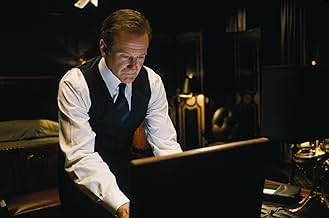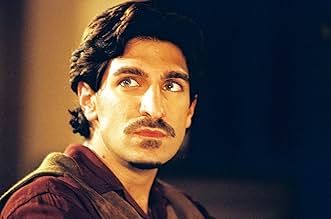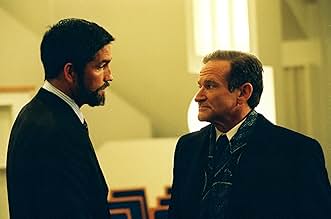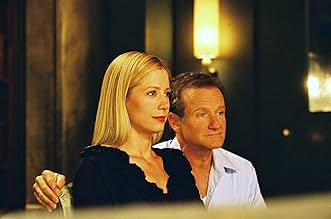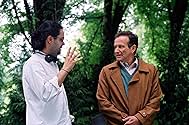PUNTUACIÓN EN IMDb
6,1/10
35 mil
TU PUNTUACIÓN
Añade un argumento en tu idiomaSet in a world with memory recording implants, Alan Hakman is a cutter, someone with the power of final edit over people's recorded histories. His latest assignment is one that puts him in d... Leer todoSet in a world with memory recording implants, Alan Hakman is a cutter, someone with the power of final edit over people's recorded histories. His latest assignment is one that puts him in danger.Set in a world with memory recording implants, Alan Hakman is a cutter, someone with the power of final edit over people's recorded histories. His latest assignment is one that puts him in danger.
- Premios
- 1 premio y 4 nominaciones en total
Tarek Bishara
- Hasan
- (as Thom Bishops)
Reseñas destacadas
It's the kind of film provoking many ethical questions about life, death, privacy and so on. Omar Naim's direction gives a glimpse into possible science discoveries and paths; its strong originality consists of showing how the state of civil rights could be threatened if these futuristic odyssey came true. The whole film is based on a steady premise, very solid performances and an impressive visual style, though special effects are not as special as one could think (given this title and this plot). Robin Williams is now accustomed to playing such frightening and alluring roles; after "Insomnia", "One hour photo" and this flick "Dead Poets Society" is now a far memory.
The plot is timely and intriguing, providing lots of food for thought as to the perhaps not-too-far future prospects of technology and our own legacies.
I agree the relationship between Williams' character and his love interest was too sketchy. With a few extra minutes expanding on those two, the film might have been more fleshed out. Overall, I enjoyed the movie. It really gave us pause to reflect on the pros and cons of the "Zoe Implant" and "rememories." Appreciated the intense acting abilities of Williams and Caviezel; otherwise, the movie might have lagged even more.
I thought the angles of the camera shots were interesting.
I agree the relationship between Williams' character and his love interest was too sketchy. With a few extra minutes expanding on those two, the film might have been more fleshed out. Overall, I enjoyed the movie. It really gave us pause to reflect on the pros and cons of the "Zoe Implant" and "rememories." Appreciated the intense acting abilities of Williams and Caviezel; otherwise, the movie might have lagged even more.
I thought the angles of the camera shots were interesting.
Set during an unspecified future era, or perhaps an "alternate universe" present era, The Final Cut posits a world in which "first person viewpoint" computer chip implants are possible for those who can afford it. These record a person's entire life from a first person viewpoint--the "camera" sees what the person sees, hears what they hear. The intention is to have an accurate, documentary-like record after the person dies. These are presented as films at their funerals. Citizens known as "cutters" (just a slang for a film editor) pare down one's life to a feature length presentation. There are also those who protest the implants. The Final Cut is the story of the latter days of a cutter, Alan W. Hakman (Robin Williams).
While The Final Cut is enjoyable enough, it has tremendous squandered potential. As one would expect, Williams turns in an incredible performance, but the script, by writer/director Omar Naim, could have used a lot of work.
The premise is fabulous. It opens many philosophical and psychological cans of worms. Some are dealt with, but only cursorily. Surely cutters go through a lot of emotional trauma as they vicariously experience the lows and the mundanities of other person's lives. Naim shows us this briefly with a recording of someone who was an abuser. But as soon as he shows us this material, he drops it. The film is advertised as a thriller. How much more exciting would it have been to embed Hakman in the middle of some grand, suspenseful plot, the details of which became known to him through data from an implant? As one of the opponents of the implant technology remarks, the implants have changed the way people relate to each other. That is a good point--it would have a profound impact on that. So why aren't we shown instances of this in the film? This could have been another hinge for a very intriguing, tense plot.
There are also issues of invasion of privacy, surveillance paranoia, consent (the implants are shown being put into infants and being permanent), and "misuse" of the data. Most of these are barely touched. Often they're only broached with a single comment, or a protester's sign.
Other fascinating issues brought up by the idea of the technology are not even mentioned. Surely, such technology would prove to be invaluable as evidence in crimes. And surely many people, especially victims, would voluntarily offer a "tap" into their implants so they can be witnesses. Why not comment on these kinds of possibilities? The Final Cut is also oddly understated with such a far-reaching sci-fi premise in this era of rubber reality films. A number of plot points, such as the one involving Louis Hunt, have almost disappointingly mundane resolutions. For that matter, for a sci-fi film set in the future or an alternate reality, there isn't much that is different about the world except for the implants. Probably the lack of differences was due to budget. It costs a lot of money to build alternate realities.
This might sound far too negative for the film to warrant a 7 out of 10 from me, which is equivalent to a "C" letter grade. Much of the film is saved by the performances. In combination with direction that is more often than not interesting and unusual, it's easy to focus on the promise of the premise rather than the unfulfilled extensions of the same.
Hakman, and presumably the other cutters, have odd dispositions. Their task is to make everyone look good--like a mortician making up a mangled body so it's "presentable" at a funeral. They spend hour upon hour as voyeurs. They are something like archivists, but also have to play detective. It makes them strangely aloof and dour. It's difficult for them to have relationships. Naim gets in a couple cracks that portray the cutters and their social relationships as similar to geeky "Internet addicts". This is all good stuff, and it's excellently played by Williams.
The flow of the film is a bit odd, and especially the ending (which I praised for its relative nihilism) is eventually abrupt in a way that doesn't exactly work (and I usually love abrupt endings). Being generous, we could take the wonky flow as a "level-removed" kind of self-reference. Of course Naim was faced with cutting the film to make it look good, but it's a bit awkward and arbitrary-feeling, just as a cutter's work would likely be when faced with having to produce a coherent 90-minute film out of 80 years' worth of material. Being less generous, Naim simply needs to learn how to better tell a story, and there was no intention of real-world reflexivity with his fictional material.
The Final Cut is worth seeing, especially if you're a Robin Williams fan as I am, but it's a disappointment considering what it could have been.
While The Final Cut is enjoyable enough, it has tremendous squandered potential. As one would expect, Williams turns in an incredible performance, but the script, by writer/director Omar Naim, could have used a lot of work.
The premise is fabulous. It opens many philosophical and psychological cans of worms. Some are dealt with, but only cursorily. Surely cutters go through a lot of emotional trauma as they vicariously experience the lows and the mundanities of other person's lives. Naim shows us this briefly with a recording of someone who was an abuser. But as soon as he shows us this material, he drops it. The film is advertised as a thriller. How much more exciting would it have been to embed Hakman in the middle of some grand, suspenseful plot, the details of which became known to him through data from an implant? As one of the opponents of the implant technology remarks, the implants have changed the way people relate to each other. That is a good point--it would have a profound impact on that. So why aren't we shown instances of this in the film? This could have been another hinge for a very intriguing, tense plot.
There are also issues of invasion of privacy, surveillance paranoia, consent (the implants are shown being put into infants and being permanent), and "misuse" of the data. Most of these are barely touched. Often they're only broached with a single comment, or a protester's sign.
Other fascinating issues brought up by the idea of the technology are not even mentioned. Surely, such technology would prove to be invaluable as evidence in crimes. And surely many people, especially victims, would voluntarily offer a "tap" into their implants so they can be witnesses. Why not comment on these kinds of possibilities? The Final Cut is also oddly understated with such a far-reaching sci-fi premise in this era of rubber reality films. A number of plot points, such as the one involving Louis Hunt, have almost disappointingly mundane resolutions. For that matter, for a sci-fi film set in the future or an alternate reality, there isn't much that is different about the world except for the implants. Probably the lack of differences was due to budget. It costs a lot of money to build alternate realities.
This might sound far too negative for the film to warrant a 7 out of 10 from me, which is equivalent to a "C" letter grade. Much of the film is saved by the performances. In combination with direction that is more often than not interesting and unusual, it's easy to focus on the promise of the premise rather than the unfulfilled extensions of the same.
Hakman, and presumably the other cutters, have odd dispositions. Their task is to make everyone look good--like a mortician making up a mangled body so it's "presentable" at a funeral. They spend hour upon hour as voyeurs. They are something like archivists, but also have to play detective. It makes them strangely aloof and dour. It's difficult for them to have relationships. Naim gets in a couple cracks that portray the cutters and their social relationships as similar to geeky "Internet addicts". This is all good stuff, and it's excellently played by Williams.
The flow of the film is a bit odd, and especially the ending (which I praised for its relative nihilism) is eventually abrupt in a way that doesn't exactly work (and I usually love abrupt endings). Being generous, we could take the wonky flow as a "level-removed" kind of self-reference. Of course Naim was faced with cutting the film to make it look good, but it's a bit awkward and arbitrary-feeling, just as a cutter's work would likely be when faced with having to produce a coherent 90-minute film out of 80 years' worth of material. Being less generous, Naim simply needs to learn how to better tell a story, and there was no intention of real-world reflexivity with his fictional material.
The Final Cut is worth seeing, especially if you're a Robin Williams fan as I am, but it's a disappointment considering what it could have been.
I have always been a Robin Williams fan. From watching him goof around in Mrs. Doubtfire when i was a kid to seeing him actually creep me out in One Hour Photo, probably his best movie to date. So i am willing to see anything he has to offer. I got a chance to see The Final Cut for free, so i took it. The plot seemed real interesting and it was a first. Later into the movie though, the plot was getting cut more than people's memories. Williams romance with Mira Sorvino (which was gag-worthy to begin with) doesn't have any closure, and the "cutting" procedure and the whole "chip in the brain" thing didn't seem too thought out. Robin Williams is good as always and he tries his best to keep you interested, and the opening of the movie was promising. I even think with a little work that director Omar Naim can make some really quality flicks. This one, however, seems like it was cut together from a better movie. Which is a shame because it was a really cool idea. 5/10
In six words: great idea-not so great execution. In a slightly vague future, Robin Williams plays a video editor named Alan, his job is assembling 1-2 hour video portraits of deceased clients whose parent's were well off enough to have had them fitted (while still in the womb) with a "Zoe" implant. Named after the corporation that initially developed this device, the implant records (24-7) everything that happens to a person during their lifetime. It is important to the story that viewers understand that these are not memories but actual recordings. This distinction is critical to the plot as well as to one of the interesting questions posed by the film; to what extent have our actual memories been distorted by time.
The editors (called cutters) must distill down this lifetime of footage into a brief highlights video, discretely deleting scenes that would be offensive to the family of the decreased. This is not that different than the writers of obituary notices (see "Closer"). The video is shown at a special memorial service called a "rememory". To add some unnecessary complexity to the story there is a violent protest group who object to the whole concept. The basis of their objection is never adequately explained but seems to be centered on the fact that the footage is by necessity all from the person's own "point-of-view", with the protesters chanting "remember for yourself".
Of course a Cutter sees everything (mostly in fast motion) making him or her privy to a person's every secret and sin. In the film they briefly raise the most interesting question posed by this whole idea, if you knew that someone (be it man or God) would replay your entire life, to what extent would it change your behavior? In the film most (but not all) people with the implant are aware that they have it.
Knowing all this stuff makes Alan a lonely man. His philosophy: "The dead mean nothing to me, I took this job out of respect for the living", has caused him to avoid close interpersonal relationships, which might compromise the many confidences he is keeping. Within the closed community of cutters he is known as a "Sin Eater" because of his willingness to sanitize the lives of the scum of the earth, accepting clients that the other cutters reject. Williams looks even sadder and more depressed than in did in "What Dreams May Come". It is a extremely restrained performance, not especially challenging but perfectly suited to the mood of this film.
Alan gets in trouble when he takes on a project for a rich widow (Stephanie Romanov). Her husband knew a lot of corporate secrets and had been playing around with their young daughter. This "messing around with something much bigger" has a Raymond Chandler feel to it, and this fits nicely with what might be called a futuristic film noir production design.
Overall the many interesting ethical and philosophical questions raised by "The Final Cut" are more interesting than the film itself. In fact, there is so little real suspense and character identification that the viewing process is mostly an exercise in pulling yourself back from your contemplation of earlier scenes so that you can follow what is happening on the screen.
The film goes wrong by introducing a parallel story about Alan's childhood. While well handled, it fails in its purpose of explaining his adult motivations. By the end we care nothing about his character or his actions and are back to day dreaming about the many issues the film raises but does not adequately address.
Then again, what do I know? I'm only a child.
The editors (called cutters) must distill down this lifetime of footage into a brief highlights video, discretely deleting scenes that would be offensive to the family of the decreased. This is not that different than the writers of obituary notices (see "Closer"). The video is shown at a special memorial service called a "rememory". To add some unnecessary complexity to the story there is a violent protest group who object to the whole concept. The basis of their objection is never adequately explained but seems to be centered on the fact that the footage is by necessity all from the person's own "point-of-view", with the protesters chanting "remember for yourself".
Of course a Cutter sees everything (mostly in fast motion) making him or her privy to a person's every secret and sin. In the film they briefly raise the most interesting question posed by this whole idea, if you knew that someone (be it man or God) would replay your entire life, to what extent would it change your behavior? In the film most (but not all) people with the implant are aware that they have it.
Knowing all this stuff makes Alan a lonely man. His philosophy: "The dead mean nothing to me, I took this job out of respect for the living", has caused him to avoid close interpersonal relationships, which might compromise the many confidences he is keeping. Within the closed community of cutters he is known as a "Sin Eater" because of his willingness to sanitize the lives of the scum of the earth, accepting clients that the other cutters reject. Williams looks even sadder and more depressed than in did in "What Dreams May Come". It is a extremely restrained performance, not especially challenging but perfectly suited to the mood of this film.
Alan gets in trouble when he takes on a project for a rich widow (Stephanie Romanov). Her husband knew a lot of corporate secrets and had been playing around with their young daughter. This "messing around with something much bigger" has a Raymond Chandler feel to it, and this fits nicely with what might be called a futuristic film noir production design.
Overall the many interesting ethical and philosophical questions raised by "The Final Cut" are more interesting than the film itself. In fact, there is so little real suspense and character identification that the viewing process is mostly an exercise in pulling yourself back from your contemplation of earlier scenes so that you can follow what is happening on the screen.
The film goes wrong by introducing a parallel story about Alan's childhood. While well handled, it fails in its purpose of explaining his adult motivations. By the end we care nothing about his character or his actions and are back to day dreaming about the many issues the film raises but does not adequately address.
Then again, what do I know? I'm only a child.
¿Sabías que...?
- CuriosidadesThe Zoe implant records all visual experiences in a person's life. In Greek, Zoe means "life".
- PifiasThe paper announcing Bannister's death states that he was 54 when he died. But, when Alan loads his implant for the first time, it states that there are 544,628 life hours to review. That number of hours would make him over 62 years of age.
- Banda sonora4 Seasons/Spring
(1725)
Written and Composed by Antonio Vivaldi (as Vivaldi)
Performed by Royal Philharmonic Orchestra (as The Royal Philharmonic)
Published by Extreme Music Library PLC
Courtesy of Extreme Production Music
Selecciones populares
Inicia sesión para calificar y añadir a tu lista para recibir recomendaciones personalizadas
- How long is The Final Cut?Con tecnología de Alexa
- What is The Final Cut about?
Detalles
- Fecha de lanzamiento
- Países de origen
- Sitio oficial
- Idioma
- Títulos en diferentes países
- La memòria dels morts
- Localizaciones del rodaje
- Empresas productoras
- Ver más compañías en los créditos en IMDbPro
Taquilla
- Recaudación en Estados Unidos y Canadá
- 551.281 US$
- Fin de semana de estreno en EE. UU. y Canadá
- 226.296 US$
- 17 oct 2004
- Recaudación en todo el mundo
- 3.222.439 US$
- Duración1 hora 35 minutos
- Color
- Mezcla de sonido
- Relación de aspecto
- 2.35 : 1
Contribuir a esta página
Sugerir un cambio o añadir el contenido que falta

Principal laguna de datos
By what name was La memoria de los muertos (2004) officially released in India in English?
Responde

